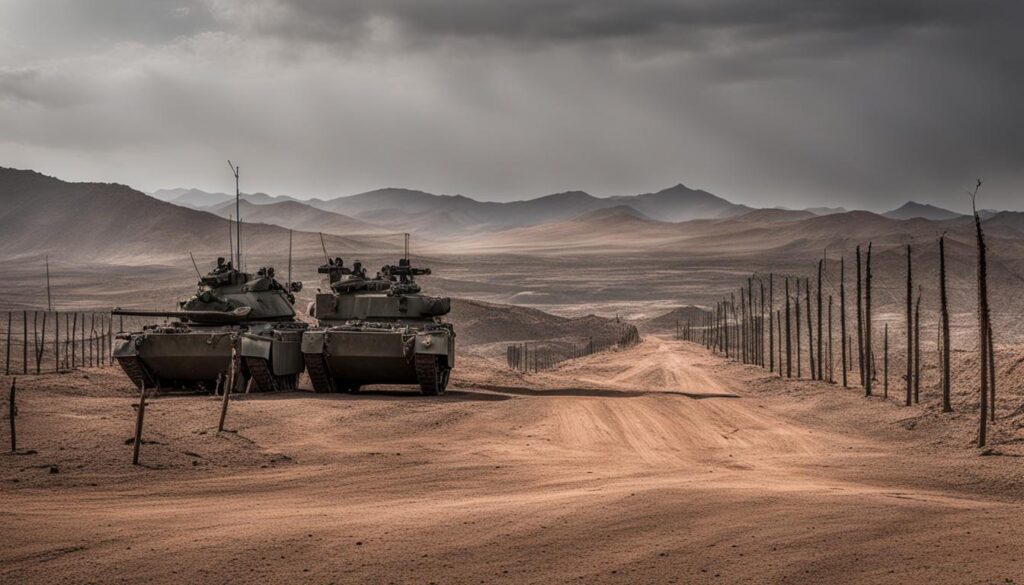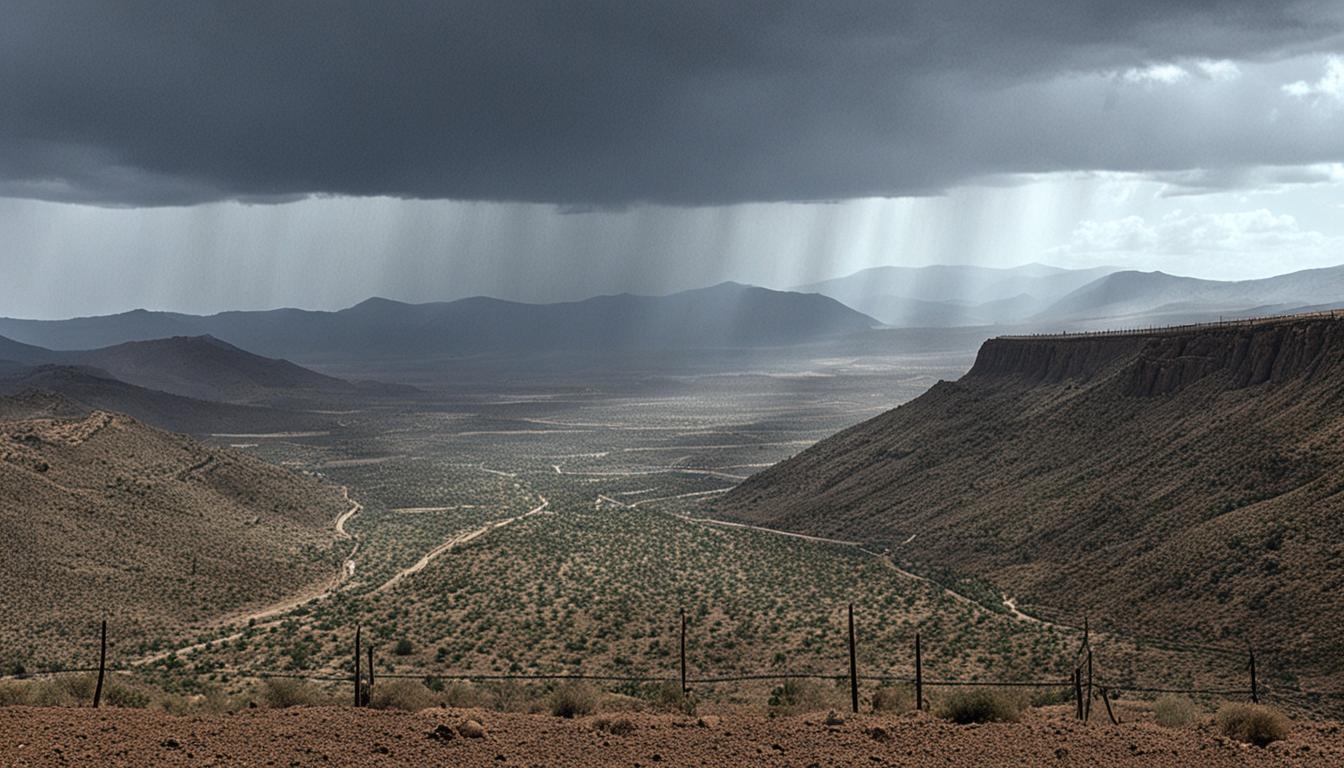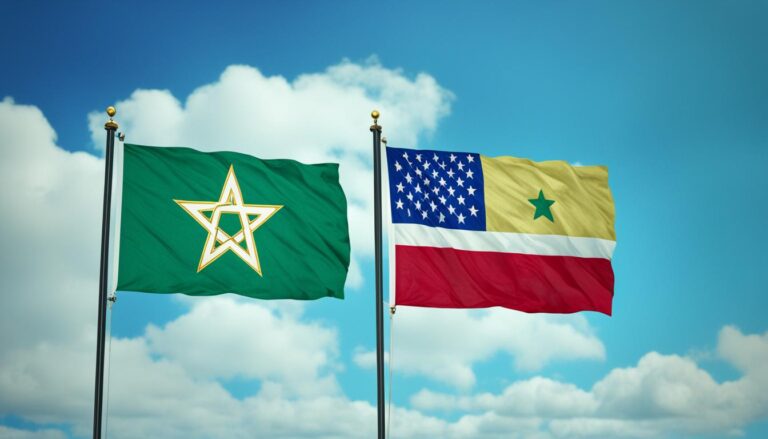Are Ethiopia and Eritrea on the Path to War?
Did you know that the relationship between Ethiopia and Eritrea has seen a significant shift from hostility to cooperation in recent years? However, there is now a growing concern that these two neighboring countries might be headed towards war once again.
The main source of tension between Ethiopia and Eritrea lies in Ethiopia’s desire to regain access to the Red Sea, a vital trade route that it lost when Eritrea gained independence in 1991. Recent military movements and increased tensions near the border have raised alarms about the potential for conflict.
In this article, we will delve into the history of Ethiopia-Eritrea relations, Ethiopia’s quest for Red Sea access, recent border tensions and military movements, the role of regional politics, key players and their motivations, potential consequences of conflict, the impact on regional stability, and the role of external actors. By exploring these key factors, we aim to gain a better understanding of the current situation and the potential implications for both Ethiopia and Eritrea, as well as the wider region.
Key Takeaways:
- Ethiopia and Eritrea have experienced a shift from hostility to cooperation in recent years.
- The desire for Red Sea access is a major driver of tension between Ethiopia and Eritrea.
- Recent military movements and border tensions raise concerns about the potential for war.
- The unresolved border dispute and regional politics contribute to the complex nature of the conflict.
- The international community plays a crucial role in preventing further escalation.
The History of Ethiopia-Eritrea Relations
The history between Ethiopia and Eritrea is complex, characterized by a longstanding border dispute and a devastating border war that spanned from 1998 to 2000. The conflict arose due to disagreements over territory and access to resources, resulting in significant casualties and widespread displacement of people.
Following the war, the two countries remained in a tense stand-off for nearly two decades, with sporadic skirmishes along the border. However, in 2018, a wave of optimism emerged when Ethiopian Prime Minister Abiy Ahmed and Eritrean President Isaias Afwerki took bold steps towards peace. They met and announced an end to the state of war, which was met with widespread praise and hopes for improved relations.
During this period, diplomatic channels reopened, and people from both countries were able to reunite with their loved ones. There was a palpable sense of optimism that lasting peace could be achieved, marking a new chapter in the relationship between Ethiopia and Eritrea.
However, despite the initial progress, unresolved issues and recent tensions have strained the relationship between Ethiopia and Eritrea once again. The path to lasting peace remains uncertain, as both countries grapple with deep-rooted historical grievances and conflicting interests.
“The wounds of the past cannot be healed overnight, and the road to genuine reconciliation requires patience, understanding, and compromise.”
Key Events in Ethiopia-Eritrea Relations
To better understand the complexities of Ethiopia-Eritrea relations, let’s take a closer look at some key events:
- The border conflict: The border war between Ethiopia and Eritrea, which lasted from 1998 to 2000, was the most significant event in recent history. It resulted in tens of thousands of casualties and a large-scale humanitarian crisis.
- The Algiers Agreement: In 2000, both countries signed the Algiers Agreement, which aimed to bring an end to the conflict and establish a mechanism for resolving the border dispute. However, implementation of the agreement stalled, leading to prolonged tensions.
- Leadership changes: With the rise of Prime Minister Abiy Ahmed in Ethiopia and President Isaias Afwerki in Eritrea, there was renewed hope for a breakthrough in the relationship between the two countries. The historic meeting between the leaders in 2018 signaled a willingness to pursue peace.
Despite these important events, challenges persist in resolving the border dispute and addressing the underlying issues that have fueled the conflict. The international community continues to monitor the situation closely, urging all parties to engage in constructive dialogue and work towards sustainable peace.
Stay tuned for the next section, where we will delve into Ethiopia’s quest for Red Sea access and its implications for the ongoing relationship with Eritrea.
Ethiopia’s Quest for Red Sea Access
Ethiopia has a strategic interest in regaining access to the Red Sea, as it would provide vital trade routes and economic opportunities. The desire to establish a direct corridor to the Red Sea has been a driving force in the complex relationship between Ethiopia and Eritrea. While both countries have made previous attempts at peace talks and conflict resolution, the border dispute remains unresolved and tensions have escalated in recent months.
Trade Routes and Economic Opportunities
The Red Sea serves as a major global trade route, connecting East Africa, the Middle East, and Asia. For landlocked Ethiopia, gaining access to the Red Sea would unlock significant economic potential by facilitating the import and export of goods through efficient maritime transportation. Ethiopia’s population of over 115 million and its rapidly growing economy further highlight the importance of establishing reliable access to international markets.
Previous Peace Talks
“Peace is the only direction that guarantees our interests…war, by nature, is destructive.” – Ethiopian Prime Minister Abiy Ahmed
Efforts have been made in the past to resolve the conflict and establish a peaceful relationship between Ethiopia and Eritrea. Notably, in 2018, Prime Minister Abiy Ahmed and Eritrean President Isaias Afwerki signed a historic peace agreement, ending a state of war that had persisted since 1998. This significant development was met with optimism and opened the door for improved diplomatic relations. However, despite initial progress, the border dispute and tension over Red Sea access remain unresolved.
The Escalation of Tensions
In recent months, tensions between Ethiopia and Eritrea have intensified, raising concerns about the potential for renewed conflict. Ethiopia’s efforts to assert its claim to Red Sea access have led to increased military movements and heightened border security. These actions have further strained an already delicate relationship and have prompted regional and international observers to call for renewed dialogue and peace talks.
The image above depicts the complexities of the Ethiopia-Eritrea conflict and the need for peaceful resolution.
It is crucial for both Ethiopia and Eritrea to engage in meaningful dialogue and prioritize peaceful conflict resolution. The international community, including neighboring countries and external actors, plays a vital role in supporting efforts to achieve lasting peace in the region. By working together and finding mutually beneficial solutions, Ethiopia and Eritrea can overcome the barriers that hinder their relationship and pave the way for a more stable and prosperous future.
Recent Border Tensions and Military Movements

Over the past year, border tensions between Ethiopia and Eritrea have escalated, raising concerns about the potential for a conflict. Ethiopian Prime Minister Abiy Ahmed has faced accusations of amassing troops near the Eritrean border, causing further unease in the region. Meanwhile, Eritrea has been making preparations for a potential war, leading to reports of heightened troop movements and increased airplane activity near the border.
The international community, including the United States, has responded to these developments by urging restraint and emphasizing the need for respect for territorial integrity. The growing possibility of a conflict between Ethiopia and Eritrea has garnered significant attention, shaping the latest news and updates.
“The increasing border tensions and military movements between Ethiopia and Eritrea are a cause for concern. We must prioritize peaceful solutions and dialogue to prevent the escalation of the conflict.” – United States Department of State
Amidst the heightened tensions, the ongoing conflict poses a significant war threat to both Ethiopia and Eritrea. It is essential for the international community and regional actors to actively engage in diplomatic efforts and seek a peaceful resolution to prevent the devastating consequences of war.
Recent Developments:
- Ethiopian Prime Minister accused of amassing troops near Eritrean border
- Eritrea preparing for a potential war
- Reports of heightened troop movements and airplane activity near the border
- International community urging restraint and respect for territorial integrity
Potential Consequences:
- Escalation of conflict, leading to a full-scale war
- Strain on Ethiopian military and resources
- Exacerbation of the humanitarian crisis following the Tigray conflict
- Significant economic costs for post-conflict recovery
The recent border tensions and military movements between Ethiopia and Eritrea underscore the urgency for peaceful conflict resolution and the preservation of regional stability.
| Key Points | Implications |
|---|---|
| Ethiopia accused of amassing troops near the Eritrean border | Risk of military confrontation between the two countries |
| Eritrea preparing for a potential war | Increase in troop deployments and heightened security measures |
| International community calling for restraint and respect for territorial integrity | Pressure on Ethiopia and Eritrea to avoid conflict and pursue peaceful solutions |
The Role of Regional Politics

The relationship between Ethiopia and Eritrea is not only influenced by their own interactions, but also by the dynamics of regional politics. Surrounding countries, such as Djibouti and Somalia, have a vested interest in the stability of the region and have expressed concerns over the recent tensions between Ethiopia and Eritrea. The quest for Red Sea access by Ethiopia has raised eyebrows among its neighboring nations, as it has implications for trade routes and economic opportunities.
Diplomatic efforts have been made to resolve the conflict and maintain regional stability. Regional organizations like the African Union and the Intergovernmental Authority on Development (IGAD) have taken active roles in mediating the dispute. These diplomatic initiatives aim to find common ground and encourage peaceful dialogue among the parties involved.
However, despite these efforts, the situation remains volatile. Regional politics and power struggles continue to shape the relationship between Ethiopia and Eritrea. The involvement of external actors and their interests further complicate the dynamics at play.
Regional Concerns and Interests
Djibouti, located on the Bab-el-Mandeb Strait, has historically served as an important maritime gateway for Ethiopia. The growing presence of Ethiopia in the Red Sea region raises concerns for Djibouti’s own strategic position. Any conflict between Ethiopia and Eritrea could potentially impact Djibouti’s trade and security interests.
Somalia, another neighbor of Ethiopia and Eritrea, has also expressed apprehension about the escalating tensions. Somalia’s fragile political situation and its own internal conflicts make it vulnerable to any spillover effects from the Ethiopia-Eritrea dispute.
Additionally, there is a broader context of regional power struggles. Countries such as Sudan and Egypt have their own interests in the region, particularly related to the Nile River and water resources. These actors might also have a stake in the resolution of the Ethiopia-Eritrea conflict.
The intricate web of regional politics adds complexity to the attempts to find a peaceful resolution. It requires careful diplomacy, effective mediation, and a nuanced understanding of the geopolitical dynamics at play.
“The stability of the region heavily relies on our ability to navigate these regional politics and find common ground. Only through dialogue and cooperation can we ensure a peaceful resolution to the tensions between Ethiopia and Eritrea.”
Diplomatic Efforts and Mediation
Various regional organizations and international actors have been actively involved in diplomatic efforts to resolve the conflict between Ethiopia and Eritrea. The African Union, in collaboration with IGAD, has been at the forefront of mediation efforts.
This table provides a snapshot of the key regional organizations and their involvement:
| Organization | Role |
|---|---|
| African Union | Facilitating dialogue and mediation between Ethiopia and Eritrea, encouraging peaceful resolution. |
| Intergovernmental Authority on Development (IGAD) | Coordinating regional efforts to mediate the conflict and foster peaceful relations. |
| United Nations | Providing support and resources for diplomatic initiatives and peacekeeping operations, if necessary. |
| United States | Acting as a mediator and encouraging both parties to engage in dialogue, while respecting the sovereignty and territorial integrity of all countries involved. |
These diplomatic efforts aim to create an environment conducive to finding a peaceful resolution and maintaining regional stability. However, the path to peace is often complex, and progress may require the reconciliation of conflicting interests and priorities.
In the face of mounting tensions, we remain committed to fostering regional cooperation and peaceful dialogue. By understanding the role of regional politics and the efforts of international organizations, we can pave the way for a sustainable resolution that benefits all parties involved.
Key Players and Their Motivations

In the complex web of the Ethiopia-Eritrea conflict, two key players have emerged, Ethiopian Prime Minister Abiy Ahmed and Eritrean President Isaias Afwerki. Their motivations and actions greatly influence the dynamics between the two countries.
Abiy Ahmed:
Abiy is known for his unique and paradoxical approach to the conflict. On one hand, he actively promotes peace and has received the Nobel Peace Prize for his efforts in resolving the dispute with Eritrea. On the other hand, he has been accused of contemplating war, leading to concerns about his true intentions.
Abiy sees Ethiopia’s access to the Red Sea as vital for the country’s development and economic growth. He views resolving the conflict with Eritrea as a means to achieve this objective. The desire to secure a strategic trade route and regain Red Sea access serves as a driving force behind his involvement in the conflict.
Isaias Afwerki:
Isaias Afwerki, Eritrea’s long-serving dictator, has a preference for proxy warfare. He has been accused of supporting armed groups in Ethiopia, further complicating the already tense situation between the two countries.
Isaias Afwerki’s motivations in the conflict are multifaceted. While he shares Abiy’s interest in Red Sea access, he also seeks to maintain control and influence over Ethiopia. By supporting armed groups, he can exert pressure and shape the direction of the conflict to serve his own interests.
The Motivations of Abiy Ahmed and Isaias Afwerki
| Abiy Ahmed | Isaias Afwerki |
|---|---|
| Promoting peace while contemplating war | Preference for proxy warfare |
| Desire for Ethiopia’s Red Sea access | Maintaining control and influence over Ethiopia |
| Viewing conflict resolution as a means to achieve economic growth | Exerting pressure through support of armed groups |
The motivations of both key players, Abiy Ahmed and Isaias Afwerki, represent the complexities and competing interests at play in the Ethiopia-Eritrea conflict. As the conflict evolves, their actions and decisions will continue to shape the trajectory of the relationship between the two countries.
Potential Consequences of Conflict
If war were to break out between Ethiopia and Eritrea, it could have severe consequences for both countries. The Ethiopian military is already spread thin, dealing with multiple challenges, and a full-scale war would further strain its resources. The Tigray conflict, which ended recently, has already resulted in a large-scale humanitarian crisis and the potential for more conflict could exacerbate this situation. Additionally, the economic cost of post-conflict recovery is estimated to be significant.
| Consequences of Conflict | Ethiopia | Eritrea |
|---|---|---|
| Humanitarian Crisis | Continued displacement of civilians, food and water shortages, increased strain on resources. | Potential refugee influx, internally displaced persons, strain on resources. |
| Economic Impact | Increased military spending, disrupted trade routes, loss of investor confidence. | Disrupted trade routes, loss of investor confidence. |
| Regional Destabilization | Escalation of conflict in neighboring regions, potential for spillover effects. | Potential increase in support for armed groups in neighboring countries. |
The consequences of a war between Ethiopia and Eritrea would extend beyond the immediate conflict zone. Both countries would face significant challenges, including ongoing humanitarian crises, economic setbacks, and the risk of regional destabilization. The impact on civilians would be devastating, with displacement, shortages, and increased strain on resources. The economic costs would be substantial, affecting trade routes and investor confidence. Moreover, the potential for regional destabilization could trigger further conflicts in neighboring regions.
It is crucial for all parties involved to prioritize diplomatic efforts and peaceful resolutions in order to avoid these negative consequences. The international community should continue to advocate for dialogue and mediation to prevent the escalation of the conflict and promote stability in the region.
The Impact on Regional Stability
The potential for conflict between Ethiopia and Eritrea extends beyond the two countries themselves. It could have a destabilizing effect on the region, particularly in neighboring countries that are already dealing with their own internal conflicts. The international community has a vested interest in maintaining regional stability and has called for peaceful resolution and respect for territorial integrity.
In such a volatile region, the escalation of the Ethiopia-Eritrea conflict threatens to exacerbate existing conflicts and create new ones. This has significant implications for the stability and security of neighboring countries, which are already grappling with their own political, social, and economic challenges.
For instance, Djibouti, a neighboring country, is home to multiple foreign military bases and vital shipping routes. Any disruption or conflict in the region could jeopardize maritime trade and security, impacting global markets and economies. Additionally, Somalia, which has been plagued by internal conflicts and terrorism, could experience further destabilization, impeding progress towards peace and development.
To prevent further violence and instability, it is crucial for all stakeholders involved to prioritize conflict resolution through diplomatic engagement and peaceful negotiations. The international community, including regional organizations such as the African Union, must support and facilitate dialogue between Ethiopia and Eritrea to find a mutually acceptable solution. This requires respecting the sovereignty and territorial integrity of each nation while addressing the underlying issues that have fueled the conflict.
Regional Stability
In order to underscore the potential consequences of the Ethiopia-Eritrea conflict, consider the following:
| Country | Stability | Existing Conflicts |
|---|---|---|
| Somalia | Highly fragile | Internal conflicts, terrorism |
| Sudan | Transitioning | Conflict in Darfur, political instability |
| South Sudan | Fragile | Civil war, political instability |
| Egypt | Stable | Dispute over Nile River water |
This table illustrates the diverse challenges faced by countries in the region, highlighting the need for stability and unity to foster peace and development. It is imperative that efforts to resolve the Ethiopia-Eritrea conflict take into account the broader regional context and work towards sustainable peace.
In the face of growing tensions, it is crucial for all parties involved to prioritize peace, dialogue, and respect for territorial integrity. Failure to do so may result in dire consequences for regional stability and the aspirations of countless individuals striving for peace and prosperity.
The Role of External Actors
External actors, such as the United States, play a crucial role in preventing further escalation of the Ethiopia-Eritrea conflict. Recently, Secretary of State Antony Blinken urged both countries to refrain from provocation and respect the sovereignty of all countries in the region. International pressure and diplomatic efforts are essential in finding a peaceful resolution to the tensions.
The United States has a vested interest in maintaining stability in the region and has demonstrated its commitment to resolving the conflict. As an influential global power, the United States has the ability to exert diplomatic pressure and facilitate dialogue between Ethiopia and Eritrea.
“We call on all parties involved to exercise restraint, deescalate tensions, and work towards peaceful solutions. Respect for international law, including the principle of territorial integrity, is vital for lasting peace and stability in the region.” – Secretary of State Antony Blinken
By actively engaging with Ethiopia and Eritrea, the United States can contribute to de-escalating tensions and fostering an environment conducive to peaceful dialogue. Additionally, other external actors, including regional and international organizations, can play a role in supporting conflict resolution efforts.
It is crucial that all stakeholders recognize the significance of finding a peaceful resolution to the Ethiopia-Eritrea conflict. Continued international pressure and diplomatic efforts will be vital in ensuring a stable and secure future for both countries and the region as a whole.
Conclusion
The relationship between Ethiopia and Eritrea is at a critical juncture, with the potential for war looming. The unresolved border dispute and Ethiopia’s quest for Red Sea access have been key drivers of tension. The actions and motivations of key players, coupled with regional politics and external pressures, will ultimately determine the path forward. It is crucial for all parties involved to prioritize dialogue, diplomacy, and the pursuit of peaceful solutions to avoid the devastating consequences of war.
The recent military movements and increased tensions near the Ethiopia-Eritrea border have raised concerns about the escalation of the conflict. Ethiopia’s aspiration for Red Sea access has strained the relationship further, while the involvement of external actors adds complexity to the situation.
In order to prevent further deterioration of the Ethiopia-Eritrea relationship, it is essential for all parties to engage in constructive dialogue and resolute diplomatic efforts. Regional stability and the well-being of the people in both countries depend on peaceful resolutions. The international community must play an active role in promoting dialogue and supporting peaceful conflict resolution in this critical time.





